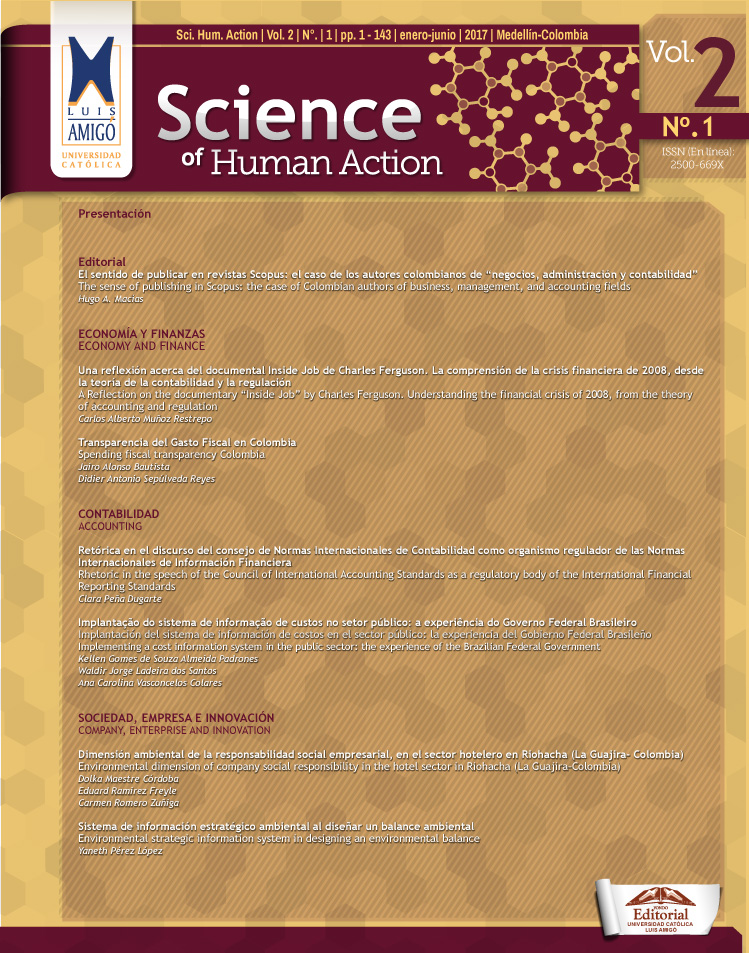Rhetoric in the speech of the Council of International Accounting Standards as a regulatory body of the International Financial Reporting Standards
DOI:
https://doi.org/10.21501/2500-669X.2322Keywords:
Retórica, discurso, contabilidad, normas internacionales.Abstract
Rhetoric is a persuasive speech seeking to intervene in the private interests of others, and through that way, to impose its criteria; and it is characterized by having a subjective perspective. From these premises, the aim of the research is to analyze the rhetoric in the speech of the IASB (International Accounting Standards Board), as a regulatory organism of IFRS (International Financial Reporting Standards). The study is framed within a qualitative approach, limited to the documentary mode. Based on the work done by Young (2003), where the influence of rhetoric in Accounting in international norms and standards was observed, and thus establish the position with respect to this research, ending with some conclusions, by which it stands out that the IASB imposes its position of how the financial information through the issuance of IFRS should be presented.Downloads
References
Abbagnano, N. (1995). Historia de la Filosofía. Barcelona: Edit. Montaner y Simón.
Aristóteles. (1926). El ‘Arte’ de Retórica. En: J. H. Helada (Trand.). Londres: Biblioteca de Loeb Classical.
Bazerman, C., Litle, J., Bettel, L., Chavkin, T., Fouquette, D., & Garufis, J. (2005). Reference guide to writing across the curriculum. Indiana: Parlor Press.
Bourdieu, P. (1990). The Logic of Practice. Cambridge: Polity Press.
Bourdieu, P. (1991). Language and Simbolic Powe. Cambridge: Polity Press.
Chua, W. (1986). Radical developments in accounting thought. The accounting Review, 61(4), 601-632.
Cockcroft, R., & Cockcroft, S. (1992). Persuading People. An Introduction to Rhetoric. London: The Macmillan Press.
Consejo de Normas Internacionales de Contabilidad. (2009). NIIF para PYMES. London. IFRS.
Consejo de Normas Internacionales de Contabilidad (2010). Prólogo de las normas Internacionales de Información Financiera. IFRS.
Fabián, L. (2011). Perspectivas de investigación, retórica y contabilidad. [Documento en línea]. Disponible: http://www.umanizales.edu.co/publicaciones/campos/economicas/lumina/12/8_perspectivas.pdf.
Gill, A., y Whedbee, K. (2000). Retórica. In t. van Dijk. El discurso como estructura y proceso. Estudios del discurso. Introducción multidisciplinaria. Barcelona: Gedisa.
Gross, A. (2006). Starring the text the place of rhetoric in science studies. Illinois: Southern Illinois University Press.
Latour, B. (1992) Ciencia en Acción. Cómo Seguir a los Científicos e Ingenieros. Barcelona: Editorial Labor.
McCloskey, D. (1994). How to do a rhetorical analysis, and why. In R. Backhouse (Ed.), Economic Methodology (pp.319-342). London: Routledge.
Palerman, C. (1997). El imperio retórico. Retórica y argumentación. Bogotá: Editorial Norma.
Young, J. (2003). Constructing, persuading and silencing: the rhetoric of accounting standards. USA. Accounting, Organizations and Society.
Downloads
Published
How to Cite
Issue
Section
License
PUBLICATIONS POLICY
• The author must send completed the declaration of transfer of economic rights and declaration of conflicts of interest, which will be provided by the management of the magazine. This document indicates the originality of the article, which is not published in another medium and that is not simultaneously postulated in another journal.
• The author will transfer all rights to the article to the journal Science Of Human Action.
• Once the evaluation of the article has begun, the authors agree not to withdraw it until the end of the process.
• The Science Of Human Action journal will submit the articles received for initial evaluation by the Editorial Committee, in case the Committee finds the material pertinent, it will be evaluated by two anonymous referees who will determine if it is publishable. If one referee approves and the other rejects it, a third party will be appointed.
• The address of Science Of Human Action will answer within a maximum of three (3) days about the receipt of the contribution received from the author.
• Printed items will not be received. All the proponents will have to send their writings through the e-mail of the magazine.
• Partial versions of the text will not be received, that is, those that are not structurally adjusted to the type of article.
• Once the article is sent, it is understood that the author authorizes the publication of these data.
• The reception of articles does not imply an obligation to publish them. The authors are directly responsible for the ideas, judgments and opinions expressed in the articles; in such a way that the content does not compromise the thinking of the Editorial Committee or the Institution.
• Once the article is submitted, it is understood that the author authorizes the publication of the data corresponding to the author's note.
• This is an open access journal that does not charge authors for either the editorial process or the publication. All costs of editorial production are assumed by the Luis Amigó Catholic University.
ETHICS OF PUBLICATION
• The Editorial Committee, by virtue of transparency in the processes, will ensure the academic quality of the journal.
• Causes of rejection are considered: plagiarism, adulteration, invention or falsification of content and author data, which are not original and unpublished.
• In no case, the journal's management will require the author to cite it or publish articles with conflicts of interest.
• If once the article is published: 1) the author discovers substantive errors that threaten the quality or scientificity, may request its removal or correction. 2) If a third party detects the error, it is the obligation of the author to retract immediately and proceed to the public removal or correction.


